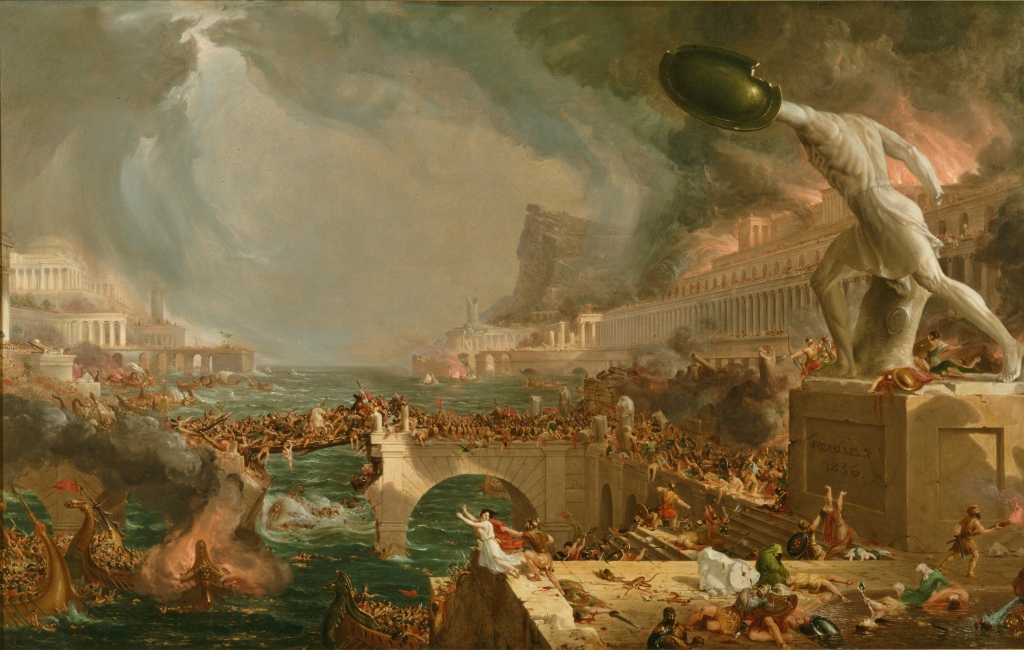
The Thirty Years’ War was winding to a close. There are short, victorious wars where the returning soldiers are greeted by bands and parades. They point with pride to eliminating a great evil or stopping a great new tyrant.
This was not that sort of war. A generation and a half of fighting had merely ground hopes and souls in to a mire of death and pain.
Six soldiers were returning home. Which, given the times, meant they were searching for their homes and praying their homes and loved ones still existed. They were greatly afraid of finding their homes and loved ones. Were their souls withered and poisoned by the things they had seen and done? Just because a thing is the best thing you can hope hope to do, doesn’t mean that it is a good thing. And they had not always done the best thing. Wrath had been their usual companion.
They were not optimistic, The folk among whom they traveled were careworn and secretive. For thirty years armies had taken that which they wanted. Food, animals, seed, even their young men. The armies had given disease and hunger.
At the edge of an oak forest these six soldiers found a village. The soldiers asked for food and a soft ground to sleep on. They were denied. To give anyone the slightest boon might attract more attention than they could afford.
So the six men marched unsteadily to the verge of the forest and slept.
In the morning four of the soldiers gleaned the woods to make a fire. Two took a large army pot to the stream. (Any sensible place to live needs a stream.) The two filled the pot halfway with water. Then they chose six stones from stream side. Carefully and with great show they cleaned the stones of any dirt and moss. They broke the clean stones in half and put them in the pot. As proudly as they could, they marched back to the fire and pot on the pot.
Eventually the aged mayor, Curtis, came out and asked what they were doing.
“You refused us food, so we are making stone soup.” said Lieutenant John.
“What is this nonsense ?”
“As you take cleaned chicken carcasses or beef bones, crack them in half to make broth, so in the army we learned to make broth with the finest stones.
“But you can’t get anything from stones.” said Mayor Curtis.
“That’s why it will take all day over the fire. But the broth will be more exquisite than any made from old bones.” replied John.
“I’ll have to try that.”
“Not on your life!” John denied. “You refuse us. This is ours.”
The mayor ambled away.
About an hour after noon a girl named Jane came by.
“Are you really making soup from stones?” asked the little girl.
“Alas, no. Broth is all. Soup is much better, but we’ve nothing to add to the broth.”
“If I brought a potato, then could I try your soup, John?”
“Maybe, Jane, but soup with just a potato isn’t much.”
“I’ll ask grandfather,” said Jane.
That afternoon one of the men found some good mushrooms under the oak trees. Some of the boys from the village brought onions. Some of the old ladies brought some carrots and herbs. Jane’s grandfather, Curtis, brought a roast which they chopped up with their army knives and put in. Some of the young women brought musical instruments.
There had been no reason for a party in the longest time. There was dancing. Everyone who wanted to come out brought something to the pot. John and the boys sang songs that they learned during their time in the army. Some were pleasantly naughty. The boys from the village knew where to pick basil and pull up garlic. Someone brought old bowls.
Come sundown everyone tried the stone soup.
Lo! It was good.
After dinner Mariah said, “This is silly. We have rooms and beds to sleep in. Our young men were taken and aren’t using them. Maybe our fellows will be offered the empty beds of your own people.”
For the first time in a very long time the village was happy. Some of the old people, including Curtis and his wife, Therese, cried themselves to sleep, but this evening their tears for their sons were tempered, softened, by the knowledge they had been good to the sons of strangers who were in the same position.
John and his men had the first free and easy time since they were forced into the army years before. Maybe they had made it out with their lives and souls after all. Maybe, just maybe, it was possible that they could still be wanted and, maybe, even loved.
– – –
Many people have said things about this story.
Rigid skeptics say it never happened.
Mystics say that we should always put stones in our soup.
Economists say- but no one listens to economists.
Religious folk say “So this is how the multitude was fed by the paltry loaves and fishes. I think I actually see souls getting cleaner and healthier.”
Militarists say we made this possible.
Pacifists cry at the waste that happened.
Epicureans say the meal is not so much about the food, as it is about companionship and conversation and friends. Valuing others and being valued. Those are the foods we truly crave.
I say: When you see someone trying desperately to make soup from nothing but stones, talk to him as an equal, joke, recite poetry, add as much to the pot as you can, listen to him.
Perhaps you will both feel better. Perhaps we all will be better.
And, just maybe, we will all be more deserving of love and better able to share it.
/cloudfront-us-east-1.images.arcpublishing.com/gray/BRO2QUIZDFDA3FFI6THT5HU2IE.jpg)






